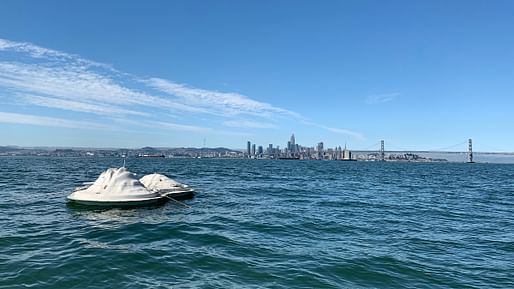

This post is brought to you by California College of the Arts (CCA)
In August 2019, California College of the Arts (CCA) Architectural Ecologies Lab, one of five research and teaching labs in CCA’s Architecture Division, launched the Buoyant Ecologies Float Lab in San Francisco Bay. The Float Lab, a cutting-edge prototype for an ecologically productive floating breakwater, builds on five years of applied research at CCA. It was initiated in the college’s integrated building design studios, in which students developed architectural proposals questioning traditional boundaries between land and water.
Merging expertise from design, advanced digital manufacturing, and marine ecology, the Float Lab imagines a new kind of architecture for climate adaptation. Conceived as a link in a chain of bean-shaped, wave-attenuating floating breakwaters that can help mitigate coastal erosion, it integrates an innovative, ecologically optimized, fiber-reinforced polymer composite hull with variable topographies that perform both above and below the water. Above, the topography is engineered to channel rainwater and produce watershed pools for intertidal or terrestrial habitats. Underwater, the hull’s peaks and valleys vary in size to provide habitats for different types of invertebrates. Water flowing along this underwater landscape brings plankton and other nutrients into these “fish apartments,” helping to promote ecological diversity. In large masses, this biological growth can help attenuate wave action and reduce coastal erosion, one of the primary impacts of climate change and sea level rise. In January 2020 and continuing throughout the project’s three-year deployment, ecological habitat prototypes will be suspended from the underside to further develop the wave attenuation potential of the optimized substrates.
Moored in the bay near Oakland’s Middle Harbor Shoreline Park, the Float Lab serves as a floating research station and an environmental demonstration project that interfaces with public education and community engagement efforts sponsored by the Port of Oakland. It is the first prototype of its kind to receive state and federal approval by regulators at the San Francisco Bay Conservation and Development Commission and the United States Army Corps of Engineers.
The Float Lab has received numerous awards, including the American Institute of Architects 2019 Innovation Award, Columbia University GSAPP 2019 Incubator Prize, and Architect Magazine’s 2018 R+D Award. It has been featured in Smithsonian Magazine and Dezeen, among many others.
The Buoyant Ecologies project is directed by Architectural Ecologies Lab directors Adam Marcus, Margaret Ikeda, and Evan Jones, who have led five research studios at the Architecture Division at California College of the Arts exploring related themes of floating architecture, material innovation, and climate adaptation. Collaborators include the Benthic Lab at Moss Landing Marine Laboratories, Kreysler & Associates, a global leader in composites manufacturing, Tri-Coastal Marine naval architects, and marine consultants DC Marine.
Project sponsors include the Port of Oakland, which owns Middle Harbor Shoreline Park and whose engineering team supervised the launch; the Center for Impact at California College of the Arts; Ashland Reactive Polymers; and Miranda Leonard.
The launch of the Float Lab was celebrated with a public event on site at Middle Harbor Shoreline Park on Saturday, September 21, which featured food, music, children’s activities, and remarks by distinguished guests, including Oakland Mayor Libby Schaaf.
Learn more about CCA's graduate and undergraduate degree programs in architecture, and the CCA Architecture Division's five research and teaching labs.
Now accepting applications for fall 2020. Click here for more info!
No Comments
Block this user
Are you sure you want to block this user and hide all related comments throughout the site?
Archinect
This is your first comment on Archinect. Your comment will be visible once approved.